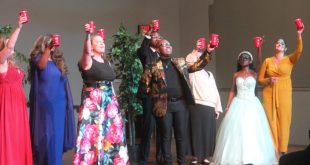Written by Kimberly Cannon, Staff Writer
Students learned about “bro-code” and the dangers of the “friend-zone” on Oct. 25 at Sex Signals, an educational program held at Valdosta State University.
According to the program’s production company, Catharsis Production, Sex Signals strives to initiate conversations about social issues. It identifies itself as an engaging program that uses laughter and honesty to educate and promote change.
Anne Dufault and David Seeber functioned as both educators and actors in the Sex Signals performance at VSU.
The two acted out improvised situations that the audience helped them create to play out scenes that would inform the audience of consensual sex, sexual harassment, sexual assault and actions that enable sexual predators.
Seeber and Dufault stressed the importance of always receiving verbal consent for sex from a prospective sexual partner, and they talked about the fact that consent is not an absolute decision because an individual can change their mind and take back consent.
The small crowd at VSU that attended Sex Signals was composed of mostly females, with only two males in the audience.
Reagan Bennett, an English graduate student, said that she thinks most college students are getting consent prior to sex, but the process of asking for specifically spoken consent every single time before sex may be excessive.
“We’re one step away from contracts, and I just think that’s a little much, but people should know their limits,” Bennett said, regarding the issue of receiving explicit verbal consent prior to sex. “I think at the heart of it is [needing better] sex education.”
Seeber and Dufault also stated that most sex education classes do not educate students on healthy relationships, and Sex Signals aims to fill in those gaps in education.
Rapists should be held accountable for their actions, and, in order to do that, blame must not be projected onto the victim, and people must call out inappropriate action, said Dufault.
Seeber and Dufault also discussed the implications of the term “friend-zone” and “bro-code.”
“Bro-code is the devil’s hall pass,” Seeber said.
Seeber explained that bro-code can force men to feel obligated to help their friends hook-up, even when it might lead to a sex crime. The word friend-zone implies that there is something wrong with two people just being friends, he said.
However, Bennett didn’t agree with bro-code being universally perceived as “the devil’s hall pass,” saying that bro-code has different connotations for different people.
“I don’t think that bro-code deals explicitly with rape culture,” Bennett said. “I’ve never viewed the bro-code as a moral issue.”
Relatability is an important aspect in the Sex Signals program.
The program uses “straightforward language and realistic scenarios to build trust and defuse the tension that can arise around the subject matter,” according to the Catharsis Production website.
Sex Signals’ credibility comes from research-supported content and more than 40 years of expertise in program development, according to the Catharsis Production website.
Sex Signals has been performed at military bases, businesses and college campuses, with more than 3,500 performances on college campuses alone and watched by over one million students, according to the Catharsis Production website.
 The Spectator The independent student newspaper of Valdosta State University
The Spectator The independent student newspaper of Valdosta State University






